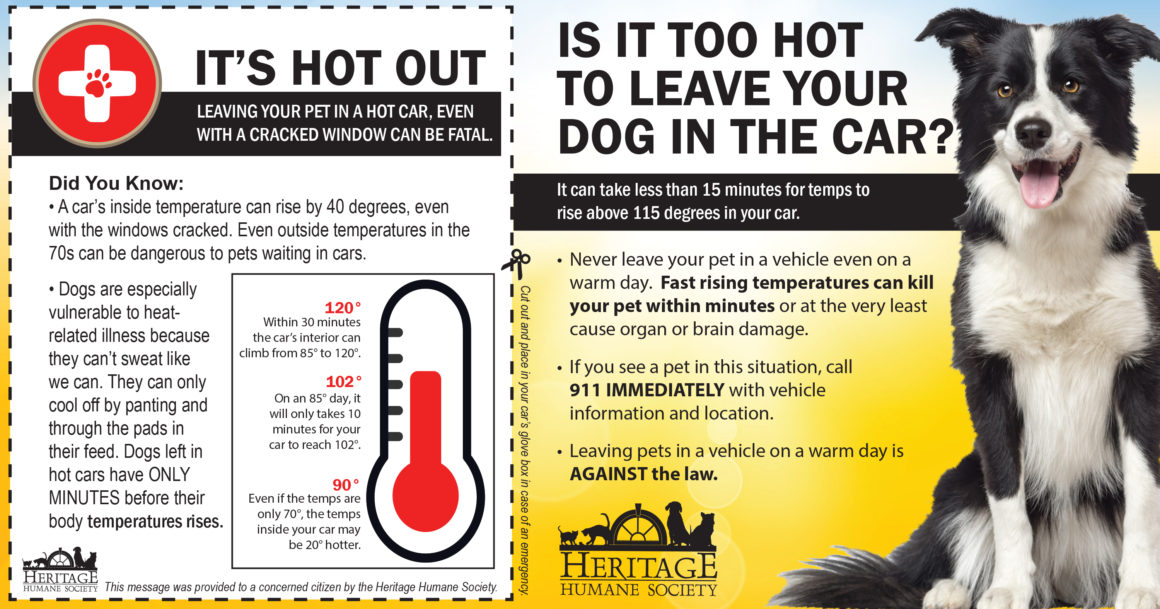Click the button above to download/print the flyers to keep in your car’s glove box. Help us spread the word around the community!
Every year, as temperatures rise, Heritage Humane Society (HHS) encounters victims of the summer heat – pets suffering from heat stroke, pets tethered with no escape from the heat, or protection from the sun, as well as pets left in hot cars. Although people take their pets along for the ride because they want to spend time together, temperatures quickly become deadly when the beloved pet is left alone in the car. Heritage Humane Society encourages the public to love their pets by leaving them at home.
According to the American Veterinary Medical Association (AVMA), the temperature inside a vehicle can rise almost 20º F in just 10 minutes. In 20 minutes, it can rise almost 30º F…and the longer you wait, the higher it goes.
Research shows that on days when the ambient temperature is 72°F or higher, it can take less than 15 minutes for temperatures to rise above 110°F in a parked vehicle. These temperatures that are deadly to animals and children. According to the Center for Disease Control (CDC) it has been proven that cracking the windows, or parking in the shade is not sufficient to keep the car cool!
“Our mission includes humane education. We hope to inform the public on the dangers of pets being exposed to excessive temperatures,” says Kimberly Laska, Executive Director.
Citizens are encouraged to visit heritagehumane.org/hotcars to gather more information, and download a flyers to print and keep in your glove box, to inform fellow pet-owners.
The American Animal Hospital Association (AAHA) provides signs that your pet is overheating include:
- Excessive panting and drooling
- Difficulty breathing
- Increased heart rate
- Mild weakness
- Stupor or actually collapsing
- Seizures
- Bloody diarrhea
- Vomiting
Short-nosed animals (e.g., Persian cats, pugs, boxers, and bulldogs) are more susceptible to heat stroke than their longer-nosed counterparts. Because of the shape of their faces, they are less effective at panting. Pets who are overweight, elderly, or have heart or lung diseases should be kept in air-conditioned rooms or in front of fans as much as possible.
If you see a pet in a hot car, follow these suggestions:
CALL 911
Take down the car’s make, model and license plate number.
If there are businesses nearby, notify their managers or security guards and ask them to make an announcement to find the car’s owner. Many people are unaware of the danger of leaving pets in hot cars and will quickly return to their vehicle once they are alerted to the situation.
Here are the numbers to Tidewater Area Animal Control Offices:
- City of Williamsburg / James City Animal Control 757-565-0370
- York County Animal Control 757-890-3601
- New Kent Animal Control 804-966-9500
- Gloucester Animal Control 804-693-5290
- Charles City Animal Control 804-829-9265
- Richmond Animal Control 804-646-5573 or after hours at 804-646-5100
If you cannot reach your local animal control authority, dial 911 immediately. Have the location, vehicle description and license plate number ready to give to dispatch.
Leaving a pet in a vehicle on warm days can be AGAINST THE LAW by failure to provide adequate care to a companion animal. (Va. Code. Ann. § 3.2-6503. Care of companion animals by owner; penalty.) It may also be considered Cruelty to Animals under Virginia Code § 3.2-6570.
In Virginia, law enforcement or animal control officers, firefighters, and emergency responders are allowed to break into vehicles to rescue pets at risk of serious injury or death. Rescuing officers won’t be liable in civil lawsuits for property damage to cars or injury to pets unless their actions amounted to “gross negligence or willful or wanton misconduct.” (Va. Code § 3.2-6504.1.)

